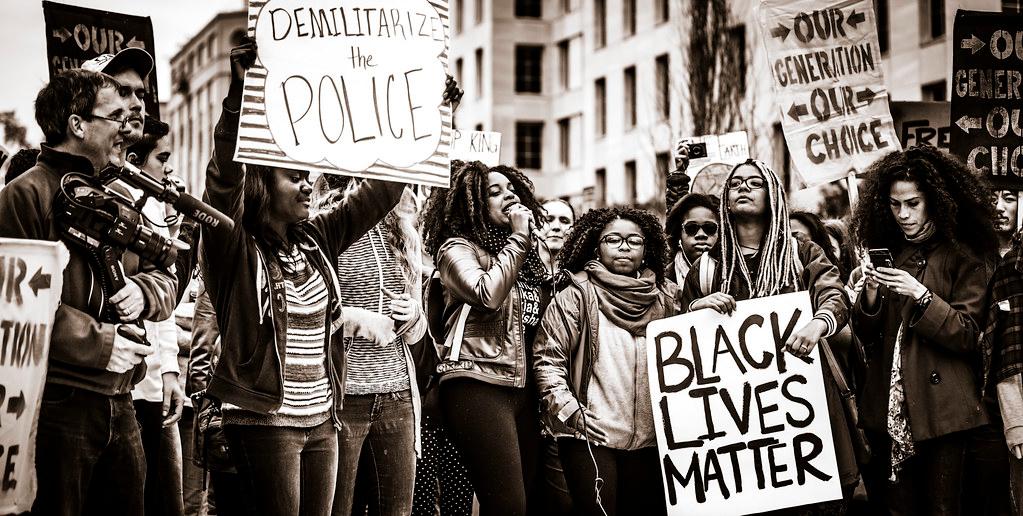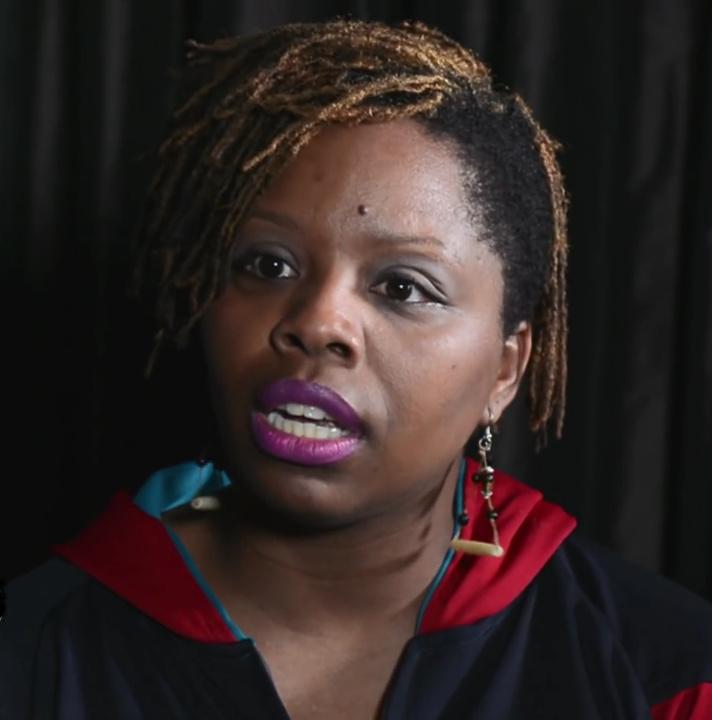Excerpt: Peace Talks with Patrisse Khan-Cullors by Richard Reed

Patrisse Khan-Cullors is many things; artist, community organiser, mother, freedom fighter. But there is one thing she most definitely is not: a terrorist. Despite what some in authority want you to believe.
Patrisse is one of the co-founders of Black Lives Matter. It is a peace movement that advocates non-violence and seeks to prevent harm. It is a movement born out of love, from black women who grew tired of seeing family members being treated unfairly, often violently so, by the police and prison system, which also honed their steely resolve to see this change. It is a movement run by some of the most marginalised people in society; black, women, queer, poor. It is a movement that seeks simply for society to respect the truth within its name. To label Black Lives Matter a terrorist organisation, as it has been referred to often, is as twisted as calling Patrisse herself a terrorist.
So what does it feel like to be called a terrorist, I ask. Patrisse goes silent for a short moment. ‘Disorientating,’ is her considered, moderate reply. ‘And totally antithetical to whom I am.’ Then with the confidence of a person who understands the bigger picture, she follows up with, ‘Of course, it is part of a long legacy of black people being called terrorists, when they are just trying to achieve equality in society.’ As she points out, Nelson Mandela was on the FBI’s list of terrorists until 2008, well after he’d won the Nobel Peace Prize.
As a small but telling indication of the unconditional commitment Patrisse and her colleagues have made to the now global movement they created, she’s making time to call me not only at 7 a.m., but at 7 a.m. on the Sunday morning of Thanksgiving weekend.

As we talk, Patrisse briefly describes her childhood growing up in LA. It is a recounting that provides both the personal context to her mission and an insight into a dystopian parallel world of growing up poor and black, especially during the government’s War on Drugs – a world where victims are often cast as the perpetrators and the people supposed to be doing the defending can turn out to be the attackers.
Her childhood included the trauma of being arrested by police at school and put into handcuffs at twelve years of age in front of her classmates on suspicion of possessing marijuana. She wasn’t carrying any, ‘but all that little-girl fear and humiliation forever settled in me at the cellular level.’ She also watched her older brother, a gentle soul with mental illness, being jailed on several occasions for non-violent crimes. Subjected to both mental and physical abuse in prison, he was denied access to medication for his schizophrenia and instead received solitary confinement and beatings.
Those personal experiences were the groundwater for her activism. But ultimately, a single inciting incident gave rise to Black Lives Matter: the death of Trayvon Martin. Seventeen-year-old Trayvon Martin was walking home one night, carrying a can of Arizona watermelon fruit juice cocktail and a packet of Skittles and talking on the phone to a friend, when he was shot by a Neighborhood Watch volunteer, who was acquitted of the charges brought against him for the shooting. That was when the dam broke. And that was when, after the tears and the anger at the situation, Patrisse Khan-Cullors began organising.
Because in Patrisse’s playbook it is getting organised that counts. ‘If you want to see change, you have to get organised. Stand for election. Win seats. It can’t be just about protesting and advocacy, it has to be about taking power.’ It is a proud, pragmatic and positive statement, entirely typical of Patrisse’s approach. ‘My story is not just about black pain and struggle, but also finding hope and doing something about it.’
There is no question that Patrisse is doing something about it. Black Lives Matter, which she co-founded with Alicia Garza and Opal Tometi, has over its short life become an international phenomenon, with chapters across the US and beyond. I ask whether her work has changed the situation for black people. Is the trend positive or negative? Her answer is typically clear-sighted. ‘It’s both. There is no binary here. Are we winning right now? No. It is a terrifying time. This last year has been the worst year on record for black deaths at the hands of officers. But what is motivating is people aren’t standing idly by, people of all ages, races, genders, sexualities, ethnicities are putting themselves on the line to fight against it. There is hope.’
Hope is the internal energy on which any positive movement runs – and, unsurprisingly, retaining hope is exactly what Patrisse advocates. ‘It is too easy to become demoralised, to say this is awful and terrible, we’re not going to get out of this. But we will. This too
shall pass. It will be a blip in history.’
To ensure that this blip is relegated to history, her strategy of using the system, rather than fighting it, is getting results. ‘In recent local elections, we have seen many black women become elected, some of the most marginalised people in our society are now in office. So, there is progress.’
We briefly discuss another social phenomenon that has been in the press recently: men getting called out for using positions of power in their workplace to indulge in inappropriate sexual behaviour. Could this be the beginnings of the crumbling of white patriarchy? ‘It’s true that we’re having a moment of clarity on this issue – people are getting fired, TV shows are getting cancelled. But if we just get rid of the individuals and don’t change the institutions themselves, it will go back to being business as usual.’
Gently, firmly, patiently, her answers tend to come back to the main point. Which is that we need to fundamentally overhaul the system; and you do that by building a machine, campaigning, getting elected, taking office. That is how you fight the power: legally, peacefully, and with an undying purpose.
So what tips does she have for people wanting to start a movement of their own?
‘Never go at it alone. It’s too important. We don’t win things alone, we win in teams. So find others to do it with. Understand your goals and be clear on what you are going to work on. Build people’s leadership and support those standing for things. And once you win, ask what’s next. It’s a long fight and it is never really over.
And her best piece of advice for winning the fight?
‘My single most important piece of advice is stay healthy. It’s too easy to become consumed by the issues that plague this country. It can have an egregious effect on you. People engaged in the fight lose their health, their mind, their life. So do whatever you need to do to stay healthy – get a therapist, eat well, exercise. You need to stay strong, to stay healthy, to be in the fight for longer.’
And that’s what matters.
Copyright © Richard Reed,
Canongate, https://conongate.co.uk/
Relatert innhold
Tasks related to the interview with BLM founder, Patrisse Khan-Cullors
How did the killing of George Floyd reignite #BLM and make it into a worldwide movement?